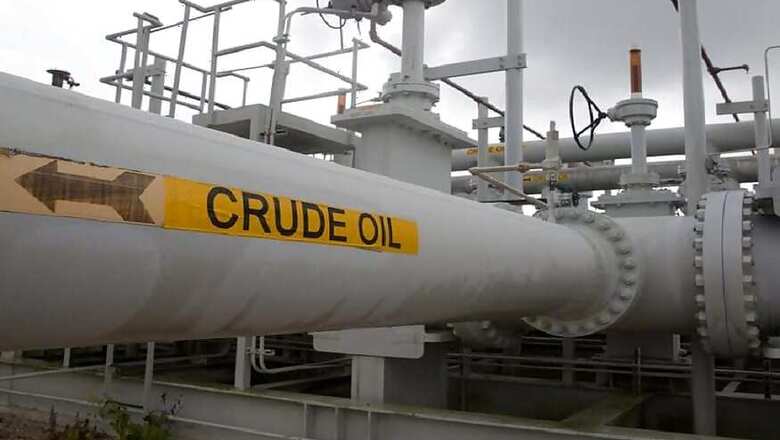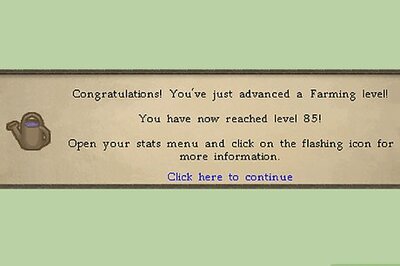
views
Fujairah: Saudi Arabia said Monday two of its oil tankers were damaged in mysterious "sabotage attacks" in the Gulf as tensions soared in a region already shaken by a standoff between the United States and Iran.
It came as US Secretary of State Mike Pompeo scrapped a planned visit to Moscow to head to Brussels instead for talks with European officials on Iran. Tehran called for an investigation into the "alarming" attacks and warned of "adventurism" by foreign players to disrupt maritime security.
Britain warned of the danger of conflict erupting "by accident" in the Gulf. The US has already strengthened its military presence in the region, including deploying a number of strategic B-52 bombers in response to alleged Iranian threats.
Saudi Arabia, the Islamic republic's regional arch-rival, condemned "the acts of sabotage which targeted commercial and civilian vessels near the territorial waters of the United Arab Emirates", a foreign ministry source said.
"This criminal act constitutes a serious threat to the security and safety of maritime navigation and adversely impacts regional and international peace and security," the source added.
The UAE said on Sunday that four commercial vessels of various nationalities had been targeted by acts of sabotage off the emirate of Fujairah. Saudi Energy Minister Khalid al-Falih said the two tankers suffered "significant damage" but there were no casualties or any oil spill.
Neither Saudi Arabia nor the UAE gave details on the nature of the attacks. The UAE minister of state for foreign affairs, Anwar Gargash, said the Emirates will probe the "deliberate sabotage" of the ships.
"The investigation will be conducted in a professional manner, the facts will be made clear, and we have our own readings and conclusions," he tweeted. Fujairah port is the only Emirati terminal located on the Arabian Sea coast, bypassing the Strait of Hormuz, through which most Gulf oil exports pass.
Iran has repeatedly threatened to close the strait in case of a military confrontation with the United States. One of the two tankers that was attacked was on its way to be loaded with crude oil from a Saudi terminal for customers in the United States, Falih said.
Oil prices rose on world markets on Monday with benchmark Brent North Sea crude up 1.8 percent at $71.90 a barrel in London. Gulf stock markets suffered losses with the Saudi bourse down 2.7 percent.
'Serious Development'
The UAE did not accuse anyone of responsibility but warned that "carrying out acts of sabotage on commercial and civilian vessels and threatening the safety and lives of those on board is a serious development".
No one was hurt and Abu Dhabi called on world powers to help keep maritime traffic safe.
Iranian foreign ministry spokesman Abbas Mousavi expressed concern over the incident and its possible consequences. "The incidents in the Sea of Oman are alarming and regrettable," Mousavi said in a statement.
He "warned against plots by ill-wishers to disrupt regional security" and "called for the vigilance of regional states in the face of any adventurism by foreign elements", it added. Almost all the oil exports of Saudi Arabia, Iraq, UAE, Kuwait, Qatar and Iran itself, at least 15 million barrels per day, are shipped through the Strait of Hormuz.
The Saudi minister denounced the attack on the vessels, saying it "aims to undermine the freedom of maritime navigation and the security of oil supplies to consumers all over the world."
The UAE had earlier categorically denied reports on social media of massive explosions in oil tankers off the coast of Fujairah, whose port on Monday was calm with no signs of damage.
'Criminal Acts'
The six-nation Gulf Cooperation Council (GCC) -- which includes Saudi Arabia and the UAE -- as well as the Arab League condemned Sunday's incident. "This is a dangerous escalation representing evil intentions by those that planned and executed this operation," GCC secretary general Abdullatif al-Zayani said in a statement.
Arab League chief Ahmed Aboul Gheit said the "criminal acts were a dangerous violation of the freedom and safety of trade". British foreign minister Jeremy Hunt called for "a period of calm".
"We are very worried about the risk of a conflict happening by accident with an escalation that is unintended on either side but ends with some kind of conflict," he said as he arrived for a meeting of EU foreign ministers in Brussels.
Last year, Saudi Arabia temporarily suspended oil shipments through the Bab al-Mandab strait -- a vital shipping route between the Arabian Peninsula and the Horn of Africa -- after two of its ships were attacked by Iran-backed Yemeni rebels.
The Pentagon said Friday that it was deploying an amphibious assault ship and a Patriot missile battery to the Middle East to bolster an aircraft carrier force sent to counter alleged Iranian threats.
The increasing tensions come after Tehran said Wednesday it had stopped respecting limits on its nuclear activities agreed under a 2015 deal with major powers.
Iran said it was responding to the sweeping unilateral sanctions that Washington has reimposed since it quit the agreement one year ago.
Pompeo revised his travel plans to include a visit to Brussels on Monday to hold talks with French, British and German officials on "pressing matters" including Iran, a State Department official said




















Comments
0 comment